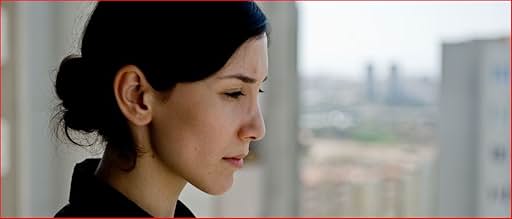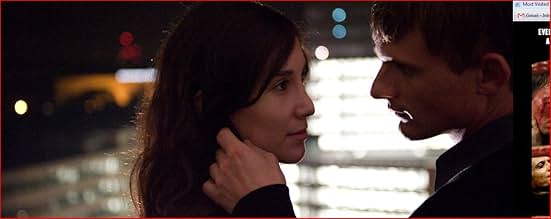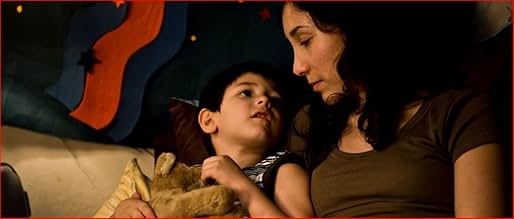CALIFICACIÓN DE IMDb
7.5/10
5.7 k
TU CALIFICACIÓN
Umay es una joven de ascendencia turca que lucha por una vida independiente y autodeterminada en Alemania contra la resistencia de su familia. Su lucha inicia una dinámica que desemboca en u... Leer todoUmay es una joven de ascendencia turca que lucha por una vida independiente y autodeterminada en Alemania contra la resistencia de su familia. Su lucha inicia una dinámica que desemboca en una situación que pone en peligro su vida.Umay es una joven de ascendencia turca que lucha por una vida independiente y autodeterminada en Alemania contra la resistencia de su familia. Su lucha inicia una dinámica que desemboca en una situación que pone en peligro su vida.
- Dirección
- Guionista
- Elenco
- Premios
- 30 premios ganados y 14 nominaciones en total
Gümeç Alpay Aslan
- Zeynep
- (as Gümec Alpay)
- Dirección
- Guionista
- Todo el elenco y el equipo
- Producción, taquilla y más en IMDbPro
Opiniones destacadas
Umay leaves her abusive husband Kemal in Istanbul with her son Cem to go home to Germany. Her father Kader is concerned about the family's honor. The older brother Mehmet is angry. The youngest brother Acar is scared but kind. Kemal rejects Umay but wants his son Cem back. As Kader and Mehmet try to force the situation, Umay calls the police and she escapes with Cem to a women's shelter. She finds a job with a supportive boss and a new boyfriend. Her younger sister Rana is rejected by her fiancee's father due to the situation. Rana tells her mother that she's desperate to marry Duran because she's secretly pregnant. Kader has to pay off the father to get them married. Umay shows up unexpectedly at the wedding and has a meltdown. Even Acar is forced to confront the lost of family honor.
The portrait of the lost of family honor is devastating. The pressure feels real. The need for Umay to reconnect with her family does feel unreasonable and excessive. I doubt a reasonable Umay would show up at the wedding. After the wedding, it seems impossible for her to go to the hospital especially carrying her son with her. Then the final scene has too many twists. It only accentuates the twisty manufactured nature of the writing. Writer/director Feo Aladag needs to tone down some of the more melodramatic developments in the last act.
The portrait of the lost of family honor is devastating. The pressure feels real. The need for Umay to reconnect with her family does feel unreasonable and excessive. I doubt a reasonable Umay would show up at the wedding. After the wedding, it seems impossible for her to go to the hospital especially carrying her son with her. Then the final scene has too many twists. It only accentuates the twisty manufactured nature of the writing. Writer/director Feo Aladag needs to tone down some of the more melodramatic developments in the last act.
This film is very realistic. Its detailed depiction of one Turkish family living in Berlin casts overtones for a greater problem of European multiculturalism. But forget the wider scope of those implications for now. The film is very focused on Turkish culture within Germany and one of its great weaknesses: what it considers to be saving the "honor" of the family. The older daughter in the film has left her violent and abusive husband in Turkey and moved back to her family in Germany. Her parents immediately side with her husband, and they repeatedly ask the daughter to return to him. But the daughter has sacrificed much to get away, and will not return. After an attempt to kidnap her son and return him to the father fails, she moves out...and moves again...and moves again as problems mount. Her younger brother and sister, although initially supportive of her, slowly begin to turn against her as the shame of her living independently with child causes the Turkish community to isolate the family. This ultimately leads to a final decision by the men in the family, with tragic results.
The family is Muslim, although Islam is not portrayed as the reason why the family is shamed by the older daughter. In the culture, it is easy for an independent woman to bring shame to the family, especially if she leaves her husband. At no time do the parents ever seriously consider the perspective of their daughter. It is quite clear, she has to maintain the family honor at all costs; which in this case means returning to her husband. As the daughter continues to make unwise choices by maintaining contact with her family because she loves them, the unwritten codes of this "honor" system will drive the family into greater acts of cruelty. This film can make you very angry indeed at the injustice to women done by patriarch based communal cultures. The "honor" that they cling to is so twisted. It is based on a superficial sense of righteousness that has little basis in truth. It is more concerned with appearances than justice. More concerned with blind obedience than righteousness. And that concept is promoted in Islam, though not exclusively.
This film should be mandatory viewing for any woman in similar straits as the main character in the film who has needed to separate from the family for safety. The Germans have provided good resources for such women, but they are advised, "For now, avoid contact with your family." One of this beautifully done film's main points is: Once you leave or are forced to leave the family, it may be for good. You cannot expect your family to sympathize with you, support you, or even accept you as family. There is a good chance they WILL turn against you if the community slanders the family. And a woman who leaves her abusive husband, lives alone, calls the police for safety, or takes any action to safeguard her life and livelihood may very well be thought of as nothing more than a "whore" by the rest of the German Turkish community. Contact your family again at risk to your life! I would wish that Turkish men (those who are perpetrators, that is) who see this would also feel ashamed for some of their sexist standards, but I don't know if they would...
The film is very moving and well done. The actors all fulfill their roles, particularly the leading lady. The eye communication of the cast is extremely profound, leaving you wondering about all of the unspoken thoughts stewing in their heads. The writing allows sympathy with all of the characters while still clearly pointing out who is right and who is wrong. You see they all have deep passions about righteousness. It's just that some are righteous and others are not. It is a simple story that casts deep shadows on complexities of cultural clashes. This is not a film that will break grounds in cinematography, but it is a brave film and urgent as the Muslim (both immigrant and native) population rises in Europe. Hopefully this will start a trend that will cause the Turkish culture to think about what true honoring of the family really is.
The family is Muslim, although Islam is not portrayed as the reason why the family is shamed by the older daughter. In the culture, it is easy for an independent woman to bring shame to the family, especially if she leaves her husband. At no time do the parents ever seriously consider the perspective of their daughter. It is quite clear, she has to maintain the family honor at all costs; which in this case means returning to her husband. As the daughter continues to make unwise choices by maintaining contact with her family because she loves them, the unwritten codes of this "honor" system will drive the family into greater acts of cruelty. This film can make you very angry indeed at the injustice to women done by patriarch based communal cultures. The "honor" that they cling to is so twisted. It is based on a superficial sense of righteousness that has little basis in truth. It is more concerned with appearances than justice. More concerned with blind obedience than righteousness. And that concept is promoted in Islam, though not exclusively.
This film should be mandatory viewing for any woman in similar straits as the main character in the film who has needed to separate from the family for safety. The Germans have provided good resources for such women, but they are advised, "For now, avoid contact with your family." One of this beautifully done film's main points is: Once you leave or are forced to leave the family, it may be for good. You cannot expect your family to sympathize with you, support you, or even accept you as family. There is a good chance they WILL turn against you if the community slanders the family. And a woman who leaves her abusive husband, lives alone, calls the police for safety, or takes any action to safeguard her life and livelihood may very well be thought of as nothing more than a "whore" by the rest of the German Turkish community. Contact your family again at risk to your life! I would wish that Turkish men (those who are perpetrators, that is) who see this would also feel ashamed for some of their sexist standards, but I don't know if they would...
The film is very moving and well done. The actors all fulfill their roles, particularly the leading lady. The eye communication of the cast is extremely profound, leaving you wondering about all of the unspoken thoughts stewing in their heads. The writing allows sympathy with all of the characters while still clearly pointing out who is right and who is wrong. You see they all have deep passions about righteousness. It's just that some are righteous and others are not. It is a simple story that casts deep shadows on complexities of cultural clashes. This is not a film that will break grounds in cinematography, but it is a brave film and urgent as the Muslim (both immigrant and native) population rises in Europe. Hopefully this will start a trend that will cause the Turkish culture to think about what true honoring of the family really is.
This kind of story is only really interesting if it is true to life. I don't know what the day to day texture of life tends to be like for Turks in Germany -- I don't even know if the characters are ethnic Turks or Kurds -- so I have to trust the movie. But I don't know whether I should. Yes, the outlines of the plot come from a true story. I can forgive the movie for ignoring that Germany and Turkey have both signed the Hague Abduction Convention, which would allow the father to get his son back. Yes, many parts of the Muslim world share the sense that honor is tied to being able to control one's women, and honor killings happen. Yes, some children in a family may acculturate differently than others. And, yes, it was nuanced. But that does not necessarily mean that the nuances are there in life rather than only in the director's head. Ingmar Bergman comes to mind, and Amos Gitai (some of whose movies I somehow forced myself to watch all the way through). My suspicions were also raised by When We Leave's contemplative quiet, which is common in this kind of art movie but not in real life. But, let me re-emphasize, I don't really know that the picture is a fantasy, I only suspect.
After seeing this film, I assumed it was directed by a Turkish director named Feo Aladag. When I googled this name, a picture of a young blond woman filled the screen. As it turned out, Feo Aladag is an Austrian actress/director, married to Turkish/German author Zuli Aladag, who is also the producer of Die Fremde.
I mention this because I think it is important. In this film, the Turkish community in Germany is not pictured in a very favourable way. The story shows the fate of Umay, a young Turkish/German woman who wants a divorce because her husband beats her and because, perhaps more importantly, she doesn't love him. She leaves her husband and moves with her young son to her family in Berlin. Surprisingly, her father and brother take sides with her husband and urge her to return to him. In their view, she has dishonoured her husband and her own family by separating her son from his father. This conflict escalates in a dramatic way, with terrible consequences.
The film pictures Umay as a woman who is denied her 'Western' rights as a woman and a mother, and shows her family as driven by 'non-Western' values like honour and tradition. For them, the community is superior over the individual. For her, it's the other way round.
The message is pessimistic. Umay is a Turkish woman who adopts the German lifestyle. She wants to live her own life. She follows the integration model that the Turkish people in Western Europe are supposed to follow. But her brother and sister don't support her, although they are born and raised in Germany. They speak the German language, but think the Turkish way.
Like some of the films of Faith Akin (in which lead actress Sibel Kekilli also starred) this film focuses on the problems of the Turkish community in Germany. But it has a darker and more pessimistic tone. It's a very powerful movie, dealing with a very urgent issue.
I mention this because I think it is important. In this film, the Turkish community in Germany is not pictured in a very favourable way. The story shows the fate of Umay, a young Turkish/German woman who wants a divorce because her husband beats her and because, perhaps more importantly, she doesn't love him. She leaves her husband and moves with her young son to her family in Berlin. Surprisingly, her father and brother take sides with her husband and urge her to return to him. In their view, she has dishonoured her husband and her own family by separating her son from his father. This conflict escalates in a dramatic way, with terrible consequences.
The film pictures Umay as a woman who is denied her 'Western' rights as a woman and a mother, and shows her family as driven by 'non-Western' values like honour and tradition. For them, the community is superior over the individual. For her, it's the other way round.
The message is pessimistic. Umay is a Turkish woman who adopts the German lifestyle. She wants to live her own life. She follows the integration model that the Turkish people in Western Europe are supposed to follow. But her brother and sister don't support her, although they are born and raised in Germany. They speak the German language, but think the Turkish way.
Like some of the films of Faith Akin (in which lead actress Sibel Kekilli also starred) this film focuses on the problems of the Turkish community in Germany. But it has a darker and more pessimistic tone. It's a very powerful movie, dealing with a very urgent issue.
This is such a difficult film to watch. It's the story of a Turkish woman trying to rise up beyond her culture and religion to pursue her autonomy. It's painful to watch given the strong performances/direction and script which will both shock you and get you reflecting on the current state of affairs.
The protagonist encounters various obstacles towards her pursuit of happiness, sadly within her own family. This is relatable regardless of your gender, cast or creed. The main actress Sibel Kekilli does a fantastic job of drawing the viewer into her turmoil. The pain she endures was truly palpable. A beautiful film.
The protagonist encounters various obstacles towards her pursuit of happiness, sadly within her own family. This is relatable regardless of your gender, cast or creed. The main actress Sibel Kekilli does a fantastic job of drawing the viewer into her turmoil. The pain she endures was truly palpable. A beautiful film.
¿Sabías que…?
- TriviaGermany's official submission for the Best Foreign Language Film Award at the 83rd Annual Academy Awards in 2011.
- ConexionesFeatures Biçak Sirti (2007)
- Bandas sonorasSO 36 - Party
Performed by Steffen Irlinger & Marian Mülle
(P) 2010 Colosseum Music Entertainment GmbH
Selecciones populares
Inicia sesión para calificar y agrega a la lista de videos para obtener recomendaciones personalizadas
- How long is When We Leave?Con tecnología de Alexa
Detalles
- Fecha de lanzamiento
- País de origen
- Sitios oficiales
- Idiomas
- También se conoce como
- When We Leave
- Locaciones de filmación
- Productoras
- Ver más créditos de la compañía en IMDbPro
Taquilla
- Total en EE. UU. y Canadá
- USD 19,631
- Fin de semana de estreno en EE. UU. y Canadá
- USD 6,018
- 30 ene 2011
- Total a nivel mundial
- USD 1,338,132
- Tiempo de ejecución1 hora 59 minutos
- Color
- Mezcla de sonido
- Relación de aspecto
- 2.35 : 1
Contribuir a esta página
Sugiere una edición o agrega el contenido que falta


























